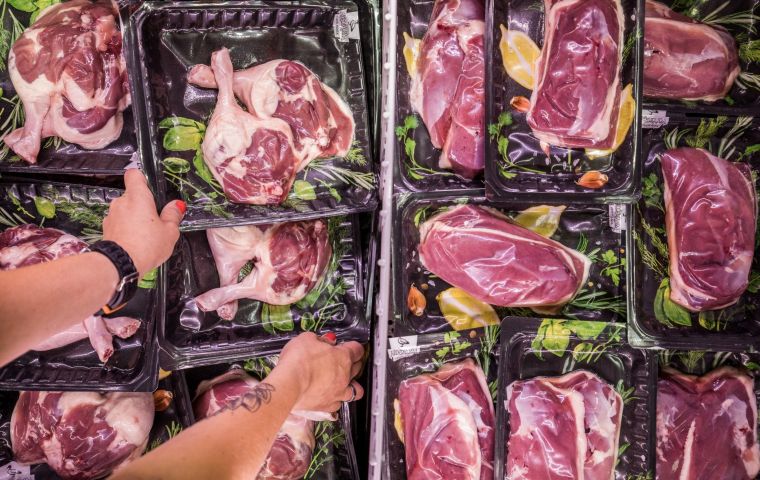MercoPress. South Atlantic News Agency
New study finds links between red meat diet and colorectal cancer incidence
 Prior research establishing the connection was mainly epidemiologic, meaning that people who developed the condition were surveyed on their eating habits
Prior research establishing the connection was mainly epidemiologic, meaning that people who developed the condition were surveyed on their eating habits AFP – A new paper in the journal Cancer Discovery has identified specific patterns of DNA damage triggered by diets rich in red meat - further implicating the food as a carcinogen while heralding the possibility of detecting cancer early and designing new treatments.
Prior research establishing the connection was mainly epidemiologic, meaning that people who developed the condition were surveyed on their eating habits, and researchers spotted associations with colorectal cancer incidence.
But a lack of clarity around the biology meant that the case wasn't quite a slam dunk, and in 2019, one team of researchers made waves when they declared they only had a “low” degree of certainty that reducing consumption would prevent cancer deaths.
“When we say red meat is carcinogenic, and that it impacts the incidence of cancer, there has to be some plausible way by which it does it,” Dana-Farber Cancer Institute oncologist Marios Giannakis, who led the new study.
After all, scientists discovered long ago which chemicals in cigarette smoke are to blame for cancer, and how certain bands of UV light penetrate the skin and trigger mutations in genes that control how cells grow and divide.
To address the knowledge gap, Giannakis and his colleagues sequenced DNA data from 900 patients with colorectal cancer, who were drawn from a much larger group of 280,000 health workers participating in a years-long study that included lifestyle surveys.
The strength of this approach is that the people documenting their diet had no way of knowing of their future cancer diagnosis, rather than asking people to recall their eating habits after they became ill.
The analysis revealed a distinct mutational signature - a pattern that had never before been identified but was indicative of a type of DNA damage called “alkylation.” Not all cells that contain these mutations will necessarily become cancerous, and the signature was present in some healthy colon samples too.
The mutation signature was significantly associated with intake of red meat, both processed and unprocessed, prior to the patient's diagnosis of cancer, but not with the intake of poultry, fish or other lifestyle factors that were examined.
“With red meat, there are chemicals that can cause alkylation,” explained Giannakis.
The specific compounds are nitroso compounds that can be made from heme, which is plentiful in red meat, as well as nitrates, often found in processed meat.
The mutation patterns were strongly associated with the distal colon - the lower part of the bowels that leads to the anal canal, which is where past research suggested colon cancer linked to red meat mostly occurs.
What's more, among the genes that were most affected by the alkylation patterns were those that previous research has shown are among the most common drivers of colorectal cancer when they mutate.
Taken as a whole, the multiple lines of evidence build up a compelling argument, said Giannakis, likening the research to careful detective work.




Top Comments
Disclaimer & comment rulesCommenting for this story is now closed.
If you have a Facebook account, become a fan and comment on our Facebook Page!